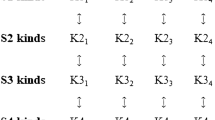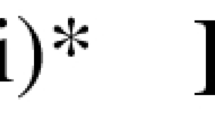Abstract
There are two principles which bear the name “Frege'sprinciple:” the principle of compositionality, and the contextprinciple. The aim of this contribution is to investigate whether thisis justified: did Frege accept both principles at the same time, did hehold the one principle but not the other, or did he, at some moment,change his opinion? The conclusion is as follows. There is a developmentin Frege's position. In the period of Grundlagen he followed to a strict form of contextuality. He repeatedcontextuality in later writings, but became less strict. From 1914 on,pushed by the needs of research, he comes close to compositionality. Buthe could never make the final step toward compositionality forprincipled reasons, therefore he always would reject compositionality.
Similar content being viewed by others
References
Angelelli, I., ed., 1967, Gottlob Frege. Kleine Schriften, Hildesheim: Olms.
Baumann, J.J., 1868–1869, Die Lehren von Raum, Zeit und Mathematik in der neueren Philosophie nach ihrem ganzen Einfluss dargestellt [etc.], Vol. I. Suarez, Descartes, Spinoza, Hobbes, Locke, Newton. Vol. II. Leibniz, Leibniz und Clarke, Berkeley, Hume, Berlin: Reimer.
Beaney, M., 1996, Frege. Making Sense, London: Duckworth.
Bynum, T. W., ed., 1972, Gottlob Frege, Conceptual Notation and Related Articles, Oxford: Oxford University Press.
Cantor, G., 1883, Grundlagen einer allgemeinen Manifaltigkeitslehre: Ein mathematischphilosphischer Versuch in der Lehre des Unendlichen, Leipzig. Reprinted as pp. 165–209 in Georg Cantor. Gesammelte Abhandlungen mathematischen und philosophischen Inhalts, E. Zermelo, ed., Hildesheim: Olms, 1932.
Cantor, M., 1855, Grundzüge einer Elementarmathematik, Heidelberg.
Carnap, R., 1947, Meaning and Necessity: A Study in Semantics and Modal Logic, Chicago, IL: The University of Chicago Press.
Currie, G., 1982, Frege: An Introduction to his Philosophy, Harvester Studies in Philosophy, Vol. 11, Brighton, Sussex: Harvester Press.
Dummett, M., 1973, Frege. Philosophy of Language, London: Duckworth.
Dummett, M., 1981, The Interpretation of Frege's Philosophy, London: Duckworth.
Dummett, M., 1995, “The context principle: Centre of Frege's philosophy,” pp. 3–19 in Logik und Mathematik. Frege-Kolloquium Jena 1993, I. Max and W. Stelzner, eds., Perspektiven der Analytische Philosophy, Vol. 5, Berlin: Walter de Gruyter.
Frege, G., 1884, Die Grundlagen der Arithmetik. Eine logisch-mathematische Untersuchung über den Begriff der Zahl, Breslau: W. Koebner. Reprint published by Georg Olms, Hildesheim, 1961. Translated by J.L. Austin, 1953.
Frege, G., 1892, “Ñber Sinn und Bedeutung,” Zeitschrift für Philosophie und philosophische Kritik 100, 25–50. Reprinted as pp. 143–162 in Gottlob Frege, Kleine Schriften, I. Angelelli, ed., Hildesheim: Olms, 1967. Translated as “On sense and reference,” pp. 56–78 in Translations from the Philosophical Writings of Gottlob Frege, P.T. Geach and M. Black, eds., Oxford: Basil Blackwell, 1952.
Frege, G., 1894, “[Rezenzion von] Dr. E.G. Husserl: Philosophie der Arithmetik. Logische und psychologische Untersuchungen. Erster Band, Leipzig, 1891,” Zeitschrift für Philosphie und philosophische Kritik CIII, 313–332. Reprinted in Angelelli (1967), translated in Geach and Black (1952).
Frege, G., 1923, “Logische Untersuchungen. Dritter Teil: Gedankengefüge,” Beiträge zur Philosophie des Deutschen Idealismus III, 36–51. Reprinted as pp. 378–294 in Angelelli (1967), translated as pp. 55–78 in Geach and Stoothoff (1977).
Frege, G., 1953, The Foundations of Arithmetic. A Logico-Mathematical Enquiry into the Concept of Number, 2nd revised edition, Oxford: Basil Blackwell. Transl. (with original text) by J.L. Austin.
Gabriel, G., Hermes, H., Kambartel, F., Thiel, C., and Veraart, A., eds., 1976, Gottlob Frege. Wissenschaftliche Briefwechsel, Hamburg: Felix Meiner.
Gabriel, G., Hermes, H., Kambartel, F., Thiel, C., and Veraart, A., 1980, Gottlob Frege. Philosophical and Mathematical Correspondence, Oxford: Basil Blackwell. Abridged by McGuiness and translated by H. Kaal.
Geach, P.T. and Black, M., 1952, Translations from the Philosophical Writings of Gottlob Frege, Oxford: Basil Blackwell.
Geach, P.T. and Stoothoff, R.H., 1977, Logical Investigations. Gottlob Frege, Oxford: Basil Blackwell.
Graß mann, H., 1860, Lehrbuch der Mathematik für höhere Lehranstalten, dl. I, Arithmetik. Stettin. Reprint in F. Engel, ed. Gesammelte mathematische und physikalische Werke/Herm. Graß mann, Leipzig: Teubner, 1894–1911, II, i.
Groenendijk, J. and Stokhof, M., 1982, “Semantic analysis of wh-complements,” Linguistics and Philosophy 5, 175–233.
Hankel, H., 1867, Vorlesungen über die complexe Zahlen und ihre Functionen, Leipzig.
Hankel, H., 1876, Theorie der complexen Zahlensysteme, Leipzig: Voss.
Hermes, H., Kambartel, F., and Kaulbach, F., eds., 1969, Gottlob Frege. Nachgelassene Schriften, Hamburg: Felix Meiner.
Hermes, H., Kambartel, F., and Kaulbach, F., eds., 1979, Gottlob Frege. Posthumous Writings, Oxford: Basil Blackwell. Translated by P. Long and R. White.
Hesse, O., 1872, Die vier Species, Leipzig: Teubner.
Hintikka, J. and Sandu, G., 1997, “Game-theoretical semantics,” pp. 361–410 in Handbook of Logic and Language, J. van Benthem and A. ter Meulen, eds., Amsterdam: Elsevier and Cambridge, MA: MIT Press.
Hodges, W., 1998, “Compositionality is not the problem,” Logic and Logical Philosophy 6, 7–33.
Hodges, W., 2001, “Formal features of compositionality,” Journal for Logic Language and Computation, 2001, this volume.
Husserl, E., 1891, Philosophie der Arithmetik. Logische und psychologische Untersuchungen, Halle an der Saale: C.E.M. Pfeffer. Reprinted in L. Eley (ed.), The Hague: Martinus Nijhoff, 1970.
Janssen, T.M.V., 1986, Foundations and Applications of Montague Grammar: Part 1, Philosophy, Framework, Computer Science, CWI Tract, No. 19, Amsterdam: Centre for Mathematics and Computer Science.
Janssen, T.M.V., 1997, “Compositionality” (with an appendix by B. Partee), pp. 417–473 in Handbook of Logic and Language, J. van Benthem and A. ter Meulen, eds., Amsterdam: Elsevier and Cambridge, MA: MIT Press.
Janssen, T.M.V., “A note on the historic context of the context principle and the compositionality principle,” unpublished note (theo@wins.uva.nl).
Jevons, W.S., 1879 Principles of Science, 3rd edition, London (first edition 1873).
Köpp, G., 1867, Schularithmetik, Eisenach.
Kossak, E., 1872, Die Elemente der Aritmetik, Programm des Friedrich-Werder'schen Gymnasium, Berlin.
Lipschitz, R., 1877–1880, Lehrbuch der Analysis, 2 Vols., Bonn: Max Cohen.
Mill, J.S., 1843, A System of Logic, Ratiocinative and Inductive, Being a Connected View of the Principles of Evidence and the Methods of Scientific Investigation, London: Parker, Son, and Bourn. Reprinted in J.M. Robson (ed.); introduction by R.F. McRae, Collected Works of John Stuart Mill, Vols. 7–8, Toronto: University of Toronto Press and London: Routledge & Kegan Paul, 1973–1974. Translated as Mill (1877).
Mill, J.S., 1877, System der deductiven und inductiven Logik: Eine Darlegung der Principien wissenschaftlicher Forschung, insbesondere der Naturforschung, 2 Vols. Braunschweig. German translation by J. Schiel.
Montague, R., 1970, “Universal grammar,” Theoria 36, 373–398. Reprinted as pp. 222–246 in Formal Philosophy. Selected Papers of Richard Montague, R.H. Thomason, ed., New Haven, CT: Yale University Press, 1974.
Montague, R., 1973, “The proper treatment of quantification in ordinary English,” pp. 221–242 in Approaches to Natural Language, K.J.J. Hintikka, J.M.E. Moravcsik, and P. Suppes, eds., Synthese Library, Vol. 49, Dordrecht: Reidel. Reprinted as pp. 247–270 in Formal Philosophy. Selected Papers of Richard Montague, R.H. Thomason, ed., New Haven, CT: Yale University Press, 1974.
Pelletier, F.J., 1994, “The principle of semantic compositionality,” Topoi 13, 11–24.
Pelletier, F.J., 2001, “Did Frege believe Frege's principle?,” Journal for Logic, Language, and Information 10, 87–114.
Resnik, M.D., 1967, “The context principle in Frege's philosophy,” Philosophy and Phenomenological Research 27, 356–365.
Resnik, M.D., 1976, “Frege's context principle revisited,” pp. 35–49 in Studien zu Frege III: Logik und Semantik, M. Schirn, ed., Stuttgart: Frommann-Holzboog.
Resnik, M.D., 1979, “Frege as idealist and then realist,” Inquiry 22, 350–357.
Rott, H., 2000, “Fregean elucidations,” Linguistics and Philosophy, to appear.
Schloemilch, D., 1881, Handbuch der algebraischen Analysis, Jena: Frommann.
Schröder, E., 1873, Lehrbuch der Arithmetik und Algebra, Leipzig.
Sluga, H.D., 1971, “Review of Frege's 'Nachgelassene Schriften',” The Journal of Philosophy LXVIII.
Sluga, H.D., 1975, “Frege and the rise of analytic philosophy,” Inquiry 18, 471–498.
Sluga, H.D., 1977, “Frege's alleged realism, Review of Bynum (1972) and Dummett (1973),” Inquiry 20, 227–242.
Thomae, J.K.J., 1880, Elementäre Theorie der analytische Functionen.
Thomason, R.H., 1974, Formal Philosophy. Selected Papers of Richard Montague, New Haven, CT: Yale University Press.
van Benthem, J. and ter Meulen, A., eds., 1997, Handbook of Logic and Language, Amsterdam: Elsevier and Cambridge, MA: MIT Press.
Wundt, W., 1880, Logik. Eine Untersuchung der Principien der Erkenntnis und der Methoden der wissenschaftlicher Forschung, Vol. I, Erkentnisslehre, 1st edition, Stuttgart: Ferdinand Enke, Stuttgart.
Zermelo, E., 1932, Georg Cantor. Gesammelte Abhandlungen mathematischen und philosophischen Inhalts, Hildesheim: Olms. Reprint published by Olms, Hildesheim, 1962.
Author information
Authors and Affiliations
Rights and permissions
About this article
Cite this article
Janssen, T.M. Frege, Contextuality and Compositionality. Journal of Logic, Language and Information 10, 115–136 (2001). https://doi.org/10.1023/A:1026542332224
Issue Date:
DOI: https://doi.org/10.1023/A:1026542332224




